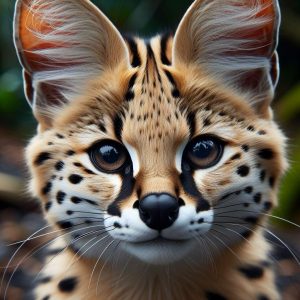Exploring Hybridization: How African Servals Mate with Domestic Cats
The concept of hybridization, where animals of different species interbreed to produce offspring, is a fascinating area of study in the realm of zoology. One particularly intriguing example of hybridization involves African servals mating with domestic cats, resulting in a hybrid known as the Savannah cat. In this article, we delve into the mechanisms that allow African servals to mate with domestic cats and produce viable offspring.
1. Biological Compatibility:
Despite their distinct species classification, African servals (Leptailurus serval) and domestic cats (Felis catus) belong to the same family, Felidae, which encompasses all cats worldwide. This shared ancestry provides a degree of biological compatibility that allows for successful mating between the two species under certain circumstances.
2. Similar Reproductive Anatomy:
African servals and domestic cats share many similarities in their reproductive anatomy, including the structure of their genitalia and the process of mating. While there may be some differences in size and morphology, these similarities enable successful copulation between male servals and female domestic cats, leading to the possibility of hybrid offspring.
3. Behavioral Factors:
Behavioral cues and mating rituals also play a role in facilitating mating between African servals and domestic cats. In captive settings where both species are kept together, opportunities for interaction and socialization may arise, leading to the formation of pair bonds and mating behavior between individuals of different species.
4. Artificial Assistance:
In some cases, hybridization between African servals and domestic cats may be facilitated by human intervention, such as assisted breeding programs or artificial insemination techniques. These methods can help overcome potential obstacles to natural mating and increase the likelihood of successful hybrid offspring.
5. Genetic Compatibility:
Despite their biological and behavioral similarities, successful hybridization between African servals and domestic cats is not guaranteed and depends on factors such as genetic compatibility and reproductive compatibility. While both species may produce viable hybrid offspring, the genetic makeup of the resulting hybrids can vary widely, leading to a diverse range of physical and behavioral traits.
Conclusion:
In conclusion, the ability of African servals to mate with domestic cats and produce viable hybrid offspring is a testament to the fascinating complexities of interspecies interactions and genetic compatibility. While the exact mechanisms that enable successful hybridization between these two species are not fully understood, factors such as biological compatibility, reproductive anatomy, behavioral cues, and genetic variation all play a role in shaping the outcome. By studying these interactions, researchers gain valuable insights into the processes of hybridization and the genetic diversity of the feline family.

Share via: